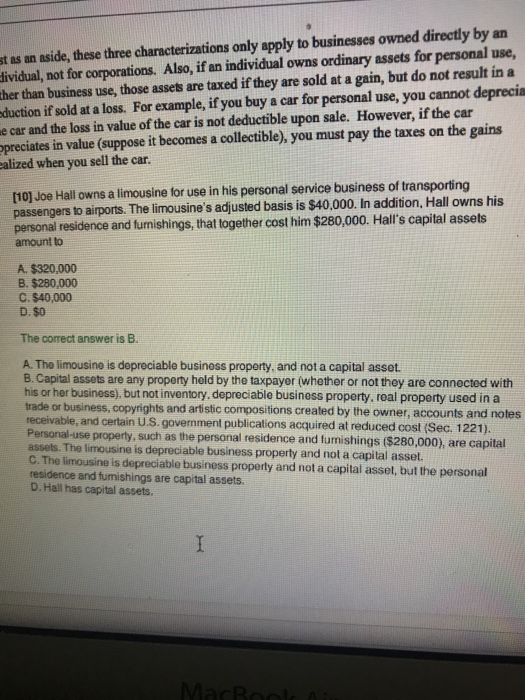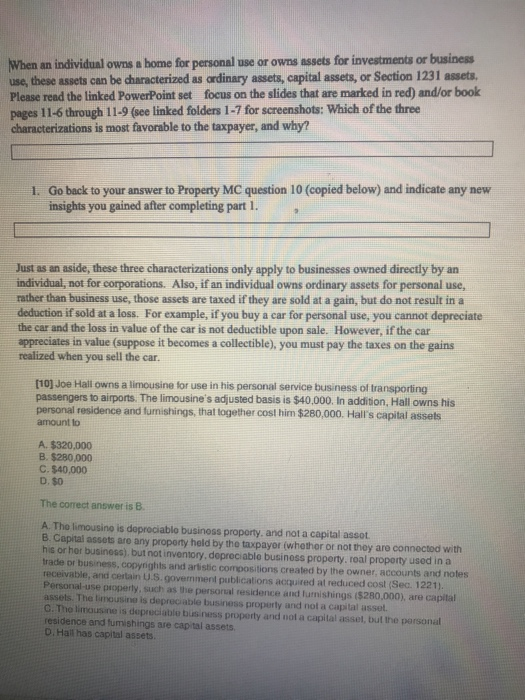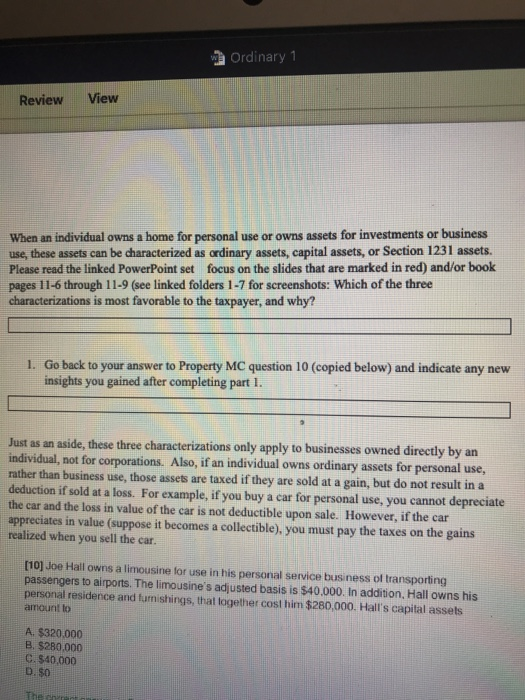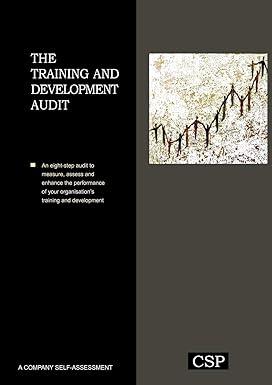
fill out form
When an individual owns a home for personal use or owns assets for investments or business use, these assets can be characterized as ordinary assets, capital assets, or Section 1231 assets. Please read the linked PowerPoint set focus on the slides that are marked in red) and/or book pages 11-6 through 11-9 (see linked folders 1-7 for screenshots: Which of the three characterizations is most favorable to the taxpayer, and why? 1. Go back to your answer to Property MC question 10 (copied below) and indicate any new insights you gained after completing part 1. Just as an aside, these three characterizations only apply to businesses owned directly by an individual, not for corporations. Also, if an individual owns ordinary assets for personal use, rather than business use, those assets are taxed if they are sold at a gain, but do not result in a deduction if sold at a loss. For example, if you buy a car for personal use, you cannot depreciate the car and the loss in value of the car is not deductible upon sale. However, if the car appreciates in value (suppose it becomes a collectible), you must pay the taxes on the gains realized when you sell the car. [10] Joe Hall owns a limousine for use in his personal service business of transporting passengers to airports. The limousine's adjusted basis is $40.000. In addition, Hall owns his personal residence and furnishings, that together cost him $280,000. Hall's capital assets amount to A. $320,000 B. $280,000 C. $40,000 D. $0 The correct answer is B A Tho limousino is depreciablo business property, and not a capital assot. B. Capital assets are any property held by the taxpayer whether or not they are connected with his or her business), but not inventory, dopreciable business property, real property used in a trade or business, copyrights and artistic compositions created by the owner accounts and notes receivable, and certain US government publications acquired at reduced cost (Sec. 1221) Personal use properly, such as the personal residence and furnishings ($280,000), are capital assels. The limousine is depreciable business properly and not a capital asset C. The limousine is depreciable business property and not a capital assel, but the personal residence and furishings are capital assets D. Hall has capital assets Ordinary 1 Review View When an individual owns a home for personal use or owns assets for investments or business use, these assets can be characterized as ordinary assets, capital assets, or Section 1231 assets. Please read the linked PowerPoint set focus on the slides that are marked in red) and/or book pages 11-6 through 11-9 (see linked folders 1-7 for screenshots: Which of the three characterizations is most favorable to the taxpayer, and why? 1. Go back to your answer to Property MC question 10 (copied below) and indicate any new insights you gained after completing part 1. Just as an aside, these three characterizations only apply to businesses owned directly by an individual, not for corporations. Also, if an individual owns ordinary assets for personal use, rather than business use, those assets are taxed if they are sold at a gain, but do not result in a deduction i sold at a loss. For example, if you buy a car for personal use, you cannot depreciate the car and the loss in value of the car is not deductible upon sale. However, if the car appreciates in value (suppose it becomes a collectible), you must pay the taxes on the gains realized when you sell the car. 10] Joe Hall owns a limousine for use in his personal service business of transporting passengers to airports. The limousine's adjusted basis is $40.000. In addition, Hall owns his personal residence and furnishings, that together cost him $280,000. Hall's capital assets amount to A. $320,000 B. $280,000 C. $40,000 D. $0 The che st as an aside, these three characterizations only apply to businesses owned directly by an dividual, not for corporations. Also, if an individual owns ordinary assets for personal use, ther than business use, those assets are taxed if they are sold at a gain, but do not result in a oduction if sold at a loss. For example, if you buy a car for personal use, you cannot deprecia he car and the loss in value of the car is not deductible upon sale. However, if the car ppreciates in value (suppose it becomes a collectible), you must pay the taxes on the gains ealized when you sell the car. [10] Joe Hall owns a limousine for use in his personal service business of transporting passengers to airports. The limousine's adjusted basis is $40.000. In addition, Hall owns his personal residence and furnishings, that together cost him $280,000. Hall's capital assets amount to A. $320,000 B. $280,000 C. $40,000 D. $0 The correct answer is B. A. The limousine is depreciable business property, and not a capital asset. B. Capital assets are any property held by the taxpayer (whether or not they are connected with his or her business), but not inventory, depreciable business property, real property used in a trade or business, copyrights and artistic compositions created by the owner, accounts and notes receivable, and certain U.S. government publications acquired at reduced cost (Sec. 1221). Personal use properly, such as the personal residence and furnishings ($280,000), are capital assets. The limousine is depreciable business properly and not a capital assel. C. The limousine is depreciable business property and not a capital asset, but the personal residence and furishings are capital assets. D. Hall has capital assets. When an individual owns a home for personal use or owns assets for investments or business use, these assets can be characterized as ordinary assets, capital assets, or Section 1231 assets. Please read the linked PowerPoint set focus on the slides that are marked in red) and/or book pages 11-6 through 11-9 (see linked folders 1-7 for screenshots: Which of the three characterizations is most favorable to the taxpayer, and why? 1. Go back to your answer to Property MC question 10 (copied below) and indicate any new insights you gained after completing part 1. Just as an aside, these three characterizations only apply to businesses owned directly by an individual, not for corporations. Also, if an individual owns ordinary assets for personal use, rather than business use, those assets are taxed if they are sold at a gain, but do not result in a deduction if sold at a loss. For example, if you buy a car for personal use, you cannot depreciate the car and the loss in value of the car is not deductible upon sale. However, if the car appreciates in value (suppose it becomes a collectible), you must pay the taxes on the gains realized when you sell the car. [10] Joe Hall owns a limousine for use in his personal service business of transporting passengers to airports. The limousine's adjusted basis is $40.000. In addition, Hall owns his personal residence and furnishings, that together cost him $280,000. Hall's capital assets amount to A. $320,000 B. $280,000 C. $40,000 D. $0 The correct answer is B A Tho limousino is depreciablo business property, and not a capital assot. B. Capital assets are any property held by the taxpayer whether or not they are connected with his or her business), but not inventory, dopreciable business property, real property used in a trade or business, copyrights and artistic compositions created by the owner accounts and notes receivable, and certain US government publications acquired at reduced cost (Sec. 1221) Personal use properly, such as the personal residence and furnishings ($280,000), are capital assels. The limousine is depreciable business properly and not a capital asset C. The limousine is depreciable business property and not a capital assel, but the personal residence and furishings are capital assets D. Hall has capital assets Ordinary 1 Review View When an individual owns a home for personal use or owns assets for investments or business use, these assets can be characterized as ordinary assets, capital assets, or Section 1231 assets. Please read the linked PowerPoint set focus on the slides that are marked in red) and/or book pages 11-6 through 11-9 (see linked folders 1-7 for screenshots: Which of the three characterizations is most favorable to the taxpayer, and why? 1. Go back to your answer to Property MC question 10 (copied below) and indicate any new insights you gained after completing part 1. Just as an aside, these three characterizations only apply to businesses owned directly by an individual, not for corporations. Also, if an individual owns ordinary assets for personal use, rather than business use, those assets are taxed if they are sold at a gain, but do not result in a deduction i sold at a loss. For example, if you buy a car for personal use, you cannot depreciate the car and the loss in value of the car is not deductible upon sale. However, if the car appreciates in value (suppose it becomes a collectible), you must pay the taxes on the gains realized when you sell the car. 10] Joe Hall owns a limousine for use in his personal service business of transporting passengers to airports. The limousine's adjusted basis is $40.000. In addition, Hall owns his personal residence and furnishings, that together cost him $280,000. Hall's capital assets amount to A. $320,000 B. $280,000 C. $40,000 D. $0 The che st as an aside, these three characterizations only apply to businesses owned directly by an dividual, not for corporations. Also, if an individual owns ordinary assets for personal use, ther than business use, those assets are taxed if they are sold at a gain, but do not result in a oduction if sold at a loss. For example, if you buy a car for personal use, you cannot deprecia he car and the loss in value of the car is not deductible upon sale. However, if the car ppreciates in value (suppose it becomes a collectible), you must pay the taxes on the gains ealized when you sell the car. [10] Joe Hall owns a limousine for use in his personal service business of transporting passengers to airports. The limousine's adjusted basis is $40.000. In addition, Hall owns his personal residence and furnishings, that together cost him $280,000. Hall's capital assets amount to A. $320,000 B. $280,000 C. $40,000 D. $0 The correct answer is B. A. The limousine is depreciable business property, and not a capital asset. B. Capital assets are any property held by the taxpayer (whether or not they are connected with his or her business), but not inventory, depreciable business property, real property used in a trade or business, copyrights and artistic compositions created by the owner, accounts and notes receivable, and certain U.S. government publications acquired at reduced cost (Sec. 1221). Personal use properly, such as the personal residence and furnishings ($280,000), are capital assets. The limousine is depreciable business properly and not a capital assel. C. The limousine is depreciable business property and not a capital asset, but the personal residence and furishings are capital assets. D. Hall has capital assets


 fill out form
fill out form





